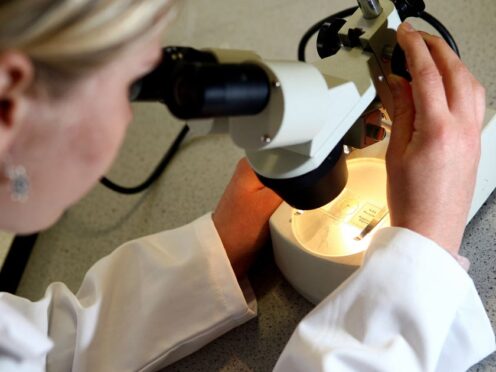
Treating patients who have a common form of breast cancer with immunotherapy, as well as chemotherapy, before and after surgery could be effective regardless of their age or if they have gone through the menopause, according to a study.
Pembrolizumab, sold under the brand name Keytruda, targets and blocks a specific protein on the surface of certain immune cells which then seek out and destroy the cancerous cells.
In England, it is offered to those with triple negative breast cancer, one of the most aggressive forms of the disease, which accounts for about 15% of cases.
However, recent findings from the Keynote-756 trial suggest it could be effective when used more widely.
Researchers explored the use of pembrolizumab on patients with early-stage breast cancer that is at high risk of recurring or spreading further, and that is oestrogen receptor positive (ER positive) and HER2 negative.
According to Cancer Research UK, about 80 in 100 breast cancer diagnoses are ER positive.
Keynote-756 has been running for eight years and comprises 1,278 patients with invasive ductal carcinoma (IDC), meaning cancer had started to spread out of the milk ducts and into the surrounding breast tissues.
Patients were either treated with pembrolizumab and chemotherapy before and after surgery, or with a placebo.
Researchers measured the lack of cancer signs in tissue samples, also known as a pathological complete response (PCR) rate.
According to Professor Javier Cortes, director of the International Breast Cancer Centre in Barcelona, Spain, researchers found a “statistically significant increase” in PCR rate among those treated with pembrolizumab.
Some 24.3% of patients had no cancer cells remaining in the breast or lymph nodes compared with 15.6% of patients treated with a placebo.
Prof Cortes said: “Now we can show that these PCR rates occurred regardless of the patients’ age or menopausal status.”
The PCR rate in patients younger than 50 was 23.8%, while in those 50 and over it was 24.7%. The rate was 23.4% in pre-menopausal women and 24.8% in those who had been through the menopause.
This compared with 16.9%, 14.2%, 16.1% and 14.6% respectively in the placebo groups.
Pembrolizumab was given the green light for NHS use in patients with triple negative breast cancer by the National Institute for health and Care Excellence (Nice) in 2022.
Triple negative breast cancer accounts for about 15% of all breast cancer cases and a quarter of all breast cancer deaths. It is more common among younger patients, black women and those with a specific mutation of the BRCA1 gene.
The therapy is also recommended by Nice for patients with cancers of the bowel, lung and skin, as well as advanced womb cancer and incurable cervical cancer.
Dr Simon Vincent, director of research, support and influencing at Breast Cancer Now, said: “This exciting study shows that adding pembrolizumab to chemotherapy before and after surgery could be more effective in eliminating cancer cells in women with the most common type of breast cancer, ER-positive HER2-negative, regardless of their age or menopausal status.
“The trial found that pembrolizumab led to more patients having no detectable cancer cells in their breast or lymph nodes when their treatment finished, although further research is needed to see whether this translates into improved survival rates and a lower likelihood of the cancer coming back.
“With over 1,000 people dying from breast cancer every month in the UK, we desperately need new and effective treatments for this disease.
“While pembrolizumab is currently used for the treatment of triple negative breast cancer, we hope the drug can be submitted to the MHRA for licensing and assessed by Nice as soon as possible so that patients with ER-positive HER2-negative breast cancer, who may also benefit from this treatment, can access it on the NHS.”
The Keynote-756 trial also found that use of pembrolizumab did not hinder the patient’s waiting time for surgery.
“The average time to surgery in both groups of patients was about a month,” Prof Cortes said. “The average time after surgery to the start of adjuvant treatment was 1.2 months in both groups.”
Tissue collected at the time of the operation was analysed to see if any cancer cells remained after the treatment – known as residual cancer burden (RCB). This was also lower in patients treated with pembrolizumab.
Some 35% of patients on the treatment had no or very small amounts of cancer cells compared with 23.6% of patients in the placebo group.
A moderate amount was found in 45.3% of placebo patients compared with 40.8% treated with pembrolizumab, while an extensive amount was found in 28.9% of the placebo group compared with 20.5% treated with the therapy.
The findings were presented as part of the European Breast Cancer Conference in Milan.
Conference chairman Professor Michail Ignatiadis, of the Institut Jules Bordet in Brussels, Belgium, said: “Longer follow-up is needed in order to see whether the improvement in PCR rates will result in more patients living for longer without their disease recurring, and we look forward to these data in due course.”

Enjoy the convenience of having The Sunday Post delivered as a digital ePaper straight to your smartphone, tablet or computer.
Subscribe for only £5.49 a month and enjoy all the benefits of the printed paper as a digital replica.
Subscribe